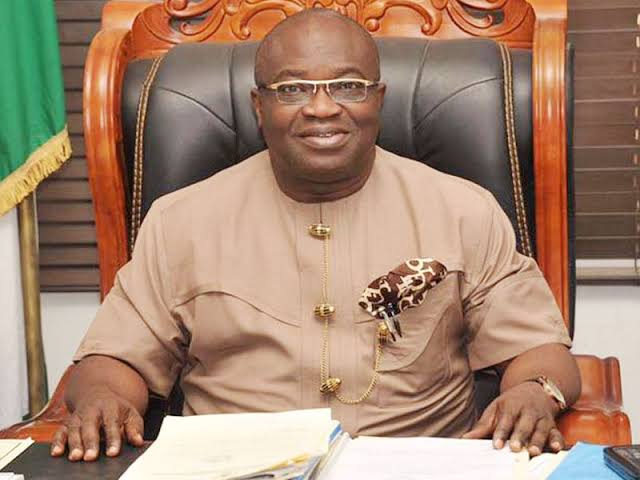
“He was an epitome of Ngwaland culture and tradition, bringing honor and dignity to the stool and the entire Ngwa nationality of Abia,” he said.
The governor went on to praise his exemplary leadership qualities and incredible lifestyle, saying that the virtues would live on in the memory of every Abia man.
As a result, he urged the state’s traditional rulers and bereaved family to strive to follow in the footsteps of the flamboyant and principled royal father.
Eze Ndubuisi Nwabeke, Chairman of the Abia Council of Traditional Rulers, said the deceased “washed his hands early in life, thus could wine and dine with kings and queens.”
According to Nwabeke, Enweremadu has exemplified Igbo culture and tradition since assuming the throne at the age of 33.
“He supported and gave meaning to our people’s culture.”
“Throughout his reign, he spoke and insisted on the use of the Igbo language as a means of communication in his palace in order to promote and preserve the language from extinction.”
“I therefore urge the state government to make the Igbo language compulsory in the state’s school curriculum,” Nwabeke said, “in order to sustain the principle that he stood for.”
Eze Nwabiarije Enogwe, Chairman of the Ukwa/Ngwa Traditional Rulers Council, also stated that the deceased came to earth with a mission to protect and preserve his ancestors’ culture and tradition.
Enogwe described him as a man of dignity, honor, and pride who was admired by current and former political leaders in Abia and throughout the country.
He emphasized the importance of the current generation following in the footsteps of the deceased, particularly in the difficult task of preserving Igbo culture and tradition.
Eze Kalu Kalu Ogbu, the Enachioken (paramount ruler) of Abiriba Kingdom in Ohafia Local Government Area, recalled the deceased’s life myth.
“We didn’t get to see Eze Enweremadu,” Ogbu said. “All we heard was a ferocious story about him.” As a child, I only had a passing acquaintance with the revered Eze: “We only heard that he was a mystic, half man, half spirit.” So, from that early stage of my life until his death recently, I was in awe of him.”
He described the deceased as “merely a phenomenon” and one of the few recognized traditional rulers in old Imo.
He was described as a hardworking, enterprising, and thoroughbred gentleman “whose reign translated into aggressive political, social, and economic emancipation of Ngwaukwu, Abia, and Nigeria.”
Prof. Ogbonna Onuoha, Deputy Vice Chancellor of Abia State University, Uturu (ABSU), described the late royal father as a repository of knowledge on Igbo culture and tradition.
Enweremadu, according to Onuoha, ensured that peace and justice prevailed in his domain during his reign, and as a result, he was highly revered by his subjects and the entire Ngwa communities.
Most Rev. Isaac Nwaobia, the Anglican Archbishop of Aba Ecclesiastical Province, said the Ngwa nation and Abia as a whole had lost a great personality.
Nwaobia described the late traditional ruler as “a true Ngwa and Abia man to the core, as well as a family man to the core.”
From a distance, you can see the man of culture, endowed with great intelligence.
Outside of traditional religion, he ensured adequate protection for people of other religions in his domain.
“He possessed a religious spirit of uprightness, and his customary white attire represented purity.” He was always in touch with his forefathers.
“In his own way, he showed the light, and others followed,” the cleric said, urging his children to follow in their father’s footsteps.
Dr Blessing Nwagba, a former governorship candidate of the Social Democratic Party in the state, described Enweremadu, who died at the age of 77, as “a great leader and a rallying point for all Ngwa sons and daughters.”
“He was a well-known entrepreneur and philanthropist who advocated for women’s economic emancipation,” she said.
Prof. Uche Ikonne, Chairman of the Central Burial Committee and former Vice Chancellor of ABSU, stated that the colloquium was organized “to give honor to whom it is due.”
He also praised the deceased for blazing a path of honor for himself when he ascended the throne at the age of 33.
The colloquium’s title, “Perspectives on the personality and enduring legacies of Enweremadu,” he said, was appropriate for a man who was seen and interpreted differently during his lifetime.
The presentation and unveiling of a book titled “Ezeukwu of Ngwaukwu: facts, fictions, and myths” was a major highlight of the event.
Prof. Ikechi Mgboji, the Commissioner for Agriculture, reviewed the book, which was a compilation of various write-ups from various perspectives on the deceased.
According to the News Agency of Nigeria (NAN), the eight-day burial rites, which began on Friday, December 10, would conclude on Friday with an interdenominational church service followed by interment.
